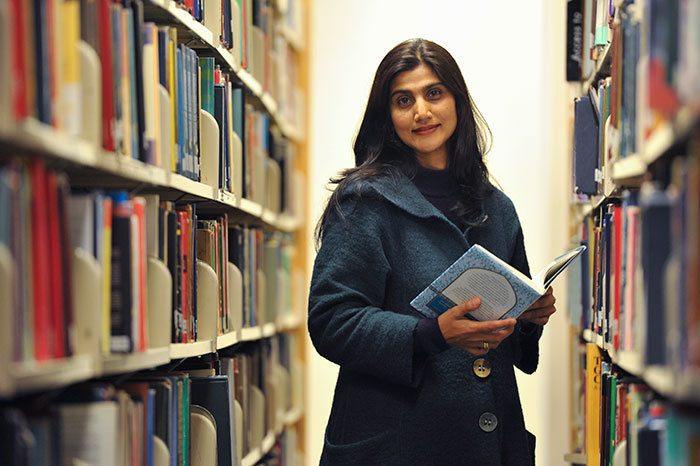Award-winning book gives voice to feminism in Islam
12 June 2015 | Story by Newsroom
Assoc Prof Sa'diyya Shaikh has won the 2015 UCT Book Award for her exploration of the ideas of a 13th century Sufi mystic, poet and scholar in Sufi Narratives of Intimacy.
Her book combines feminism and Sufism in such a unique way that critics have labelled it "ground-breaking" and "pioneering".
It represents a dialogue between the social and spiritual concerns of 21st century Muslims on the one hand and the rich legacy of a compelling Muslim thinker – Muhyi al-Din ibn al-'Arabi – on the other.
Ibn 'Arabi was a 13th century Sufi scholar and mystic from Andalusia in southern Spain who, according to Shaikh, held revolutionary ideas about gender. "In the thirteenth century, he holds the position that women can lead mixed (congregational) prayers not because they are equal (to men) and it's the right thing to do, but because men and women have the same access to the fundamental condition of being human. So, everything that emerges from this condition of being fully human in terms of rights and responsibilities applies to both men and women. For many contemporary Muslims, this might seem like a radical position, but it comes from a deeply grounded understanding of Islam," explains Shaikh.
The book had been years in the making. She began her study on Ibn 'Arabi during her doctoral dissertation, and decided that she needed to make some of his dense esoteric ideas more accessible. "I hoped that if I could successfully write the book in a style that invited and drew in the reader, they might be enticed into staying with a set of sophisticated Sufi ideas long enough to see the value for contemporary societies," she says.
Shaikh describes the book as reflecting a feminist voice within Islam. "I map how Sufism resides at the heart of Muslim spirituality and has fundamental implications for thinking about gender in terms of law, virtue and ethics. My book is about reading critically and constructively against the grain, and claiming a particular space within the Muslim tradition to talk back to patriarchy. It is about claiming an authority within the tradition not for me, but for a certain voice of radical human equality which resides within the tradition."
A moment of awe
Shaikh first encountered the writings of Ibn 'Arabi whilst participating in a graduate course on Sufism during her time as a Fulbright scholar in America.
"I was sitting with another graduate student reading (Ibn 'Arabi) texts in Arabic and English, and it was one of those moments that time seemed to have condensed: the sun had set, hours had passed and the two of us didn't notice the entire world go by. It was a moment of genuine, absolute awe. I came out of it marvelling at the vastness and possibilities of being human. The questions of what it means to be human within the Muslim tradition, and how gender influences one's understandings of a person's humanity remained with me."
Her interest in existential questions like these underpins her interest in religion – more specifically Islam. "Religion has always provided a complex, ambivalent framing narrative for me to grapple with those questions. I don't think there is one religious narrative at all. There are multiple narratives within religious traditions and I have struggled, grappled, challenged, worked with, been nourished by, found solace in, fought with, argued with, pulled apart and put together these narratives because in all its ambiguity and messiness, religion has informed my framing of reality," she added.
Shaikh also grew up with interesting stories about Sufi teachers and saints, which her father simply referred to as "good Muslim people. He never called them Sufis". The stories left a deep impression on her and the central characters caught her attention because of their honesty, integrity, courage and "some supernatural stuff, which as a kid you really like". These stories of "good Muslims" also inextricably linked spiritual awareness – a God-consciousness – with that it meant to be an ethical and virtuous human being.
No contest between Islam and feminism
While Sufism demands adherence to rigorous spiritual discipline (like additional fasting or late-night prayers), Shaikh argues that Sufi spiritual practice extends to the individual's engagement with his or her community. "Sufism is about embodying virtue. That virtue should extend from within oneself to society, an integral part of the spiritual life. Importantly justice is one of the central virtues in this tradition. The challenge to contemporary Muslims is to formulate dynamic and relevant understandings of justice for our times."
Religion is also not the only vehicle for transformation of the self and society. "Feminism gives me a language with which I can speak to my comrades and sisters in other (religious) traditions or those in no traditions who are struggling with injustice because as human beings we share, confront and resist these realities collectively and as part of diverse communities of belonging."
|
Sa'diyya Shaikh received the UCT Book Award at the 15h00 graduation ceremony on 12 June 2015. See who else has won the UCT Book Award over the years. |
Story by Abigail Calata. Photo by Michael Hammond.
 This work is licensed under a Creative Commons Attribution-NoDerivatives 4.0 International License.
This work is licensed under a Creative Commons Attribution-NoDerivatives 4.0 International License.
Please view the republishing articles page for more information.










